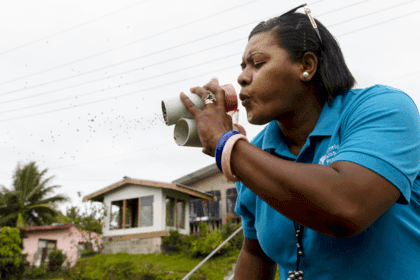
Wellcome responds to WHO declaring Mpox a public health emergency
Wellcome responds to the declaration of Mpox as a 'Public Health Emergency of International Concern' by the World Health Organization.

Since the beginning of this year, the Democratic Republic of Congo has been experiencing a severe outbreak of Mpox, with more than 14,000 reported cases and 524 deaths. In the past month, around 90 confirmed and more suspected cases have been reported in four countries neighbouring the DRC that have not reported before - Burundi, Kenya, Rwanda and Uganda.
Mpox outbreaks are caused by different viruses called ‘clades’. Clade I is common in Central Africa, with high virulence and causing severe disease with a high case fatality ratio. The newly identified clade Ib is particularly concerning as it causes serious illness and can spread through sexual contact (as is clade IIb which caused the 2022-23 outbreak), significantly complicating efforts to control the outbreak.
On Tuesday 13 August, Africa CDC announced that this outbreak is a 'Public Health Emergency of Continental Security', and today (Wednesday 14 August) the World Health Organization declared a 'Public Health Emergency of International Concern'. Responding to this news, Josie Golding, Head of Epidemics & Epidemiology in Wellcome’s Infectious Disease team, said:
"Mpox has been a growing threat to global health since the seventies, particularly for communities in low-resource settings. But since 2022, infection rates have been increasing at a rate not seen before. The newly identified Mpox virus responsible for the current outbreak – clade Ib – is particularly concerning due to its ability to spread via sexual contact and cause serious illness.
"This virus has been affecting people in West and Central Africa for decades and is now spreading to countries where Mpox has not been seen before. We have learnt over the past five years that the world should not wait for diseases to escalate and cross borders before acting.
"It has been just two years since Mpox was last declared a ‘Public Health Emergency of International Concern’ in July 2022. This announcement should be a wake-up call – we are not living in post-pandemic world, this is the age of epidemics which threaten to override efforts to achieve health equity.
"The Africa CDC announcement of a ‘Public Health Emergency of Continental Security’ on Tuesday and the WHO declaration of Mpox as a 'Public Health Emergency of International Concern' are a strong signal for those across the continent and worldwide to join forces and coordinate efforts to control this virus. Without a global, coordinated response on all levels – from local and national governments, and public and private industry to funders, regulators and NGOs – disease outbreaks cannot be controlled or prevented.
"The enemy of infectious disease prevention and control is a lack of knowledge and limited action. We need to understand how the disease spreads, how the virus changes and is passed between people, what symptoms it causes in order to identify appropriate tools for diagnosing, preventing and treating all the different types of Mpox virus. And we need enhanced surveillance, and to engage with affected communities to understand how they view and respond to cases to create effective, context-specific interventions for local people.
"It is only through a comprehensive, collaborative approach to fill these knowledge gaps that we can better control Mpox now and in the future, reducing its long-term threat to global health."

